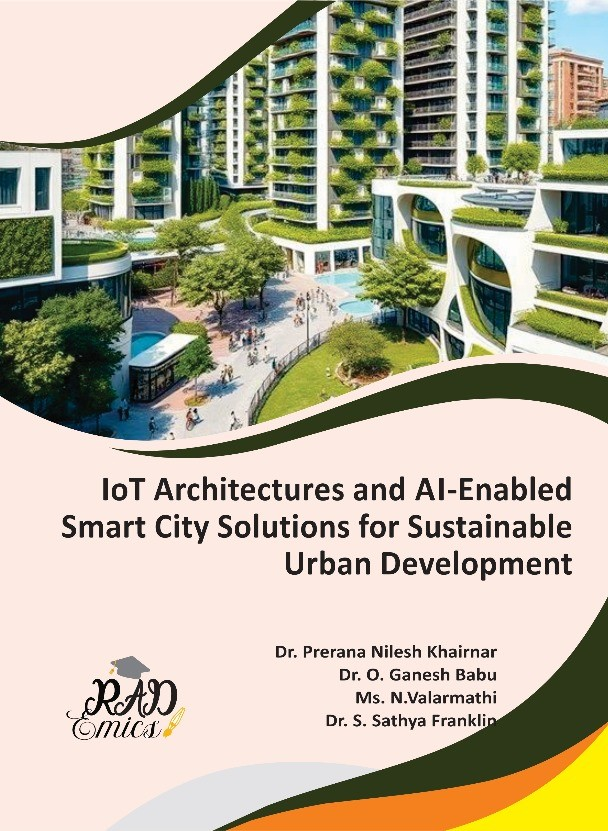
Peer Reviewed Chapter
Chapter Name : IoT Based Smart Waste Management and Automated Recycling Systems for Sustainable Urban Environments
Author Name : Ganesh Babu Oorkavalan, Padmapriya Subramaniyan
Copyright: ©2025 | Pages: 35
DOI: 10.71443/9789349552241-09
Received: 24/04/2025 Accepted: 21/03/2025 Published: 24/04/2025
Abstract
The increasing global urbanization has necessitated innovative solutions for waste management, particularly in the context of sustainable urban environments. IoT-based smart waste management and automated recycling systems have emerged as transformative technologies, offering highly efficient and eco-friendly methods to address urban waste challenges. This chapter provides an in-depth exploration of the role of advanced technologies in waste sorting, recycling, and composting, emphasizing automation, IoT integration, and artificial intelligence (AI). The application of robotic sorting systems, machine learning, sensor technologies, and automated composting processes are highlighted, with a focus on their impact on operational efficiency, cost reduction, and environmental sustainability. Additionally, the chapter examines key challenges and opportunities associated with deploying these technologies in large-scale urban waste management systems, including regulatory considerations, data privacy issues, and the need for seamless system integration. The integration of IoT-enabled devices for real-time monitoring and automated control is presented as a cornerstone for enhancing system performance and reducing human intervention. This chapter also discusses the potential for integrating circular economy principles through the development of intelligent waste management frameworks that foster sustainable urban living. The combination of these technologies not only supports efficient waste disposal but also contributes to the advancement of urban sustainability goals.
Introduction
The rapid pace of urbanization globally has led to the emergence of significant challenges in waste management, necessitating more efficient, scalable, and sustainable solutions [1]. As urban populations continue to grow, the demand for effective waste management systems becomes increasingly critical [2]. Traditional waste management methods, which often rely on manual processes and limited automation, are becoming insufficient to handle the scale and complexity of urban waste [3]. Consequently, cities are facing increased pressure to find innovative approaches to waste disposal and recycling that minimize environmental impact and improve efficiency [4]. In response to these challenges, IoT-based smart waste management systems, combined with automation and advanced technologies, offer a promising solution. These systems are capable of revolutionizing waste management practices by streamlining processes, optimizing resource use, and contributing to sustainability goals [5].
The integration of IoT (Internet of Things) technologies in waste management systems has introduced a new era of real-time monitoring and automation, allowing cities to better manage waste streams, reduce operational costs, and enhance the efficiency of recycling efforts [6]. IoT-enabled sensors and devices can track various factors such as waste generation rates, waste composition, and collection schedules [7]. This data-driven approach allows for better decision-making, enabling waste management systems to operate in a more dynamic and responsive manner [8]. With the increasing need for data integration, the ability to optimize waste collection routes, improve recycling rates, and monitor environmental parameters has never been more important [9]. The combination of IoT and automation is helping cities transition from traditional waste management to smart, sustainable urban solutions [10].
In parallel, advancements in automation technologies, including robotic sorting systems and artificial intelligence (AI), are playing a pivotal role in modernizing waste processing [11]. Robotic sorting systems, for example, use AI algorithms to identify and separate different materials, ensuring that recyclable materials are processed with greater accuracy and efficiency [12]. These systems are not only reducing labor costs but also enhancing the overall effectiveness of waste recycling operations by increasing sorting accuracy and reducing contamination levels [13]. AI-driven systems are being used to predict waste generation patterns, optimize resource allocation, and improve the overall efficiency of waste management strategies [14]. The potential of AI in the context of waste management is vast, as it can lead to smarter, more adaptive systems that can continuously evolve based on new data and trends [15].